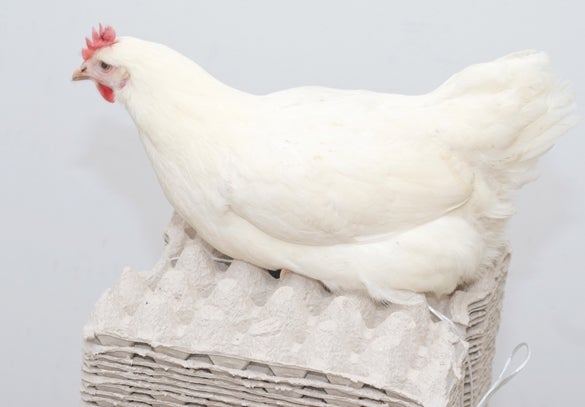The People for the Ethical Treatment of Animals (PETA) may be best known for throwing paint on models and actresses sporting furs, but the group has lately set its sights on a Central Massachusetts-based company.
Specifically, the animal rights group has targeted Natick-based BJ’s Wholesale Club because of the killing methods used by the retailer’s poultry suppliers.
And because PETA owns more than $2,000 worth of stock in BJ’s Wholesale, it has the right to place a proposal on the agenda for the company’s annual shareholders’ meeting, scheduled for May 26.
Moral Issues
The infamous and sometimes controversial organization plans to use that right to urge BJ’s shareholders to adopt a policy encouraging the company to purchase all of its poultry products from suppliers that use what PETA believes is a more humane method of slaughtering birds.
BJ’s board of directors opposes the proposal, arguing in the company’s proxy statement that studies thus far on comparisons between the killing methods are inconclusive.
When it comes to shareholder proposals, social issues like animal welfare are unusual, according to Michael Refolo, an attorney with the Worcester-based law firm of Mirick O’Connell who has represented public companies.
Corporate governance and executive pay proposals make up about 90 percent of such proposals, with social proposals coming in at less than 10 percent, Refolo estimated.
There are ways a company can try to get a proposal excluded from its meeting agenda. BJ’s may have been able to do that with the PETA proposal because an identical proposal a year ago received little support, Refolo said.
But seeking SEC exclusions cost time and money, and BJ’s may believe that the proposal doesn’t have much chance of passing after an identical proposal was voted down by shareholders last year.
So the company may have simply opted to hear PETA out again, said Refolo’s colleague, attorney James Donnelly, who has represented activist shareholders.
“Many companies are willing to listen to the point of view of people that have ideas on social issues,” Donnelly said. “BJ’s is apparently in the category that is willing to do that.”
BJ’s did not return a call seeking comment on the PETA proposal for this story.
PETA has been investing in public companies with the aim of pressuring those companies on animal rights for about a decade, according to Amber Driscoll, a corporate liaison for PETA.
“PETA’s strategy is to purchase the minimum amount of shares we need to be able to take these opportunities to shareholders directly,” Driscoll said.
As You Sow, an organization that encourages and tracks corporate environmental and social accountability, awarded PETA the most active shareholder activist group four years in a row, from 2004 to 2008.
Though Driscoll would not disclose a full list of the company shares that PETA owns, she said that the nonprofit owns 51 shares in McDonald’s Corp., 192 shares in Tyson Foods and 214 shares in Smithfield Foods.
Method In Question
The proposal that PETA is bringing to BJ’s shareholders has been brought before a number of other companies with some success, Driscoll said.
PETA wants BJ’s to switch to turkey and chicken suppliers that use a slaughtering method called “controlled atmosphere killing,” or CAK.
The proposal is graphic, a strategy PETA has used as a way to pressure companies to compromise ahead of shareholder meetings.
PETA argues that CAK, which uses the gradual introduction of gasses to the birds’ air supply, putting them “to sleep,” is a more humane, clean and efficient alternative to “electric immobilization,” in which the birds are shackled live, shocked with electrified water, have their throats cut and then have their feather removed in tanks of scalding water.
“The strategy is to get the message out about the reality of conventional slaughterhouses and the cruelty that goes on behind those closed doors,” Driscoll said.
BJ’s board is urging shareholders to vote against the proposal, arguing that its suppliers, Perdue Farms and Tyson Foods, employ the industry’s accepted best practices in the killing of their birds.
BJ’s also argues that research thus far on the benefits of CAK is inconclusive, with the National Chicken Council concluding that more research is warranted.
Donnelly said that beyond its opposing argument for shareholders, BJ’s may be concerned about switching suppliers, either because it might cost more or because a smaller supplier may not be able to provide the amount of product that BJ’s requires for its stores.
BJ’s may be a tough nut for PETA to crack. Shareholders voted the CAK proposal down by a 45-to-1 margin in last year.
But PETA has had some success in pressuring other companies to change the way they cage or slaughter birds, including Chipotle Mexican Grill, Carl’s Jr., Hardee’s and Burger King, according to its website.

